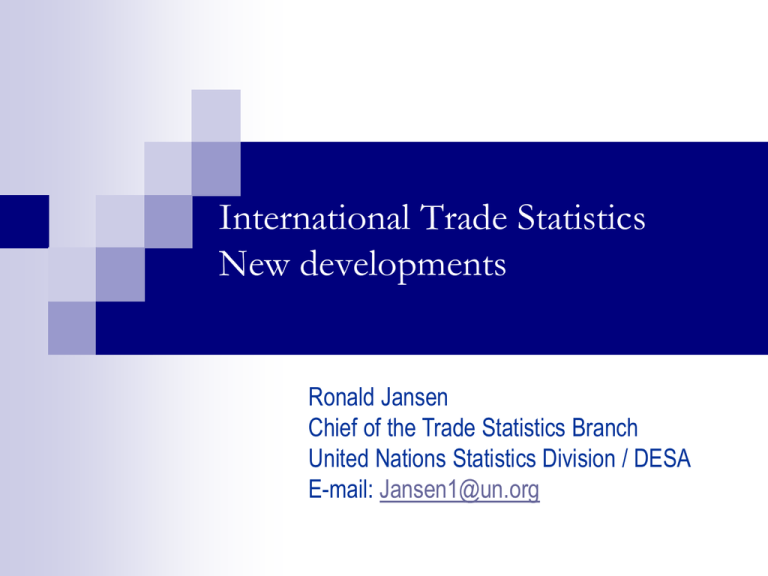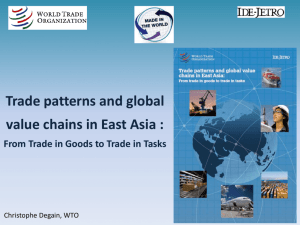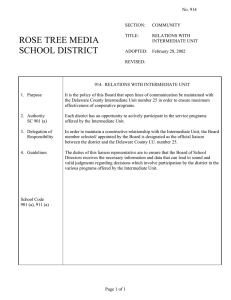
International Trade Statistics
New developments
Ronald Jansen
Chief of the Trade Statistics Branch
United Nations Statistics Division / DESA
E-mail: Jansen1@un.org
International standards
2008 SNA
2008 IRIS
Balance of Payments Manual, 6th Edition
Current Account
Goods – Residency and Change of Ownership
Services – Residency
Classifications
ISIC,
Rev.4
CPC 2.0
International standards - Trade
International Merchandise Trade Statistics, Concepts and
Definitions 2010 (IMTS 2010)
Movement of Goods across Borders
Main data source – Customs declarations
Manual on Statistics of International Trade in Services, 2010
(MSITS2010)
BOP services components
FATS
Modes of Supply
Balance of Payments Manual, 6th Edition
Current Account
Goods – Residency and Change of Ownership
Services – Residency
Classifications
HS-2012
CPC 2.0
EBOPS
Compilation Guidance - Trade
International Merchandise Trade Statistics, Compilers Manual
Compilers Guide for MSITS2010
Expert Group on Compilation of SITS
Time schedule – June 1013
BPM6 Compilation Guide
Expert Group on IMTS
Customs and Non-customs data sources
Country practices
BOPCOM committee
First drafts have appeared on IMF website
Classifications
Revision of BEC
New classification for Business Functions (Outsourcing)
Revised recommendations - Trade
IMTS 2010 – new data elements
Imports FOB added – useful for reconciliation
exercises
Partner country of consignment – useful for
reconciliation studies
Mode of Transport
Customs procedure
Direct imports / exports
Inward / Outward processing
Free zone trade
Global
Production
Data Dissemination - Trade
UN Comtrade – Upgrade
New data elements added
Anticipation of further dimensions - industry
Addition of Monthly data
Publications
More analytical
Integrating Trade in Goods and Services
Monthly trends
Revised recommendations - Trade
MSITS 2010 – changes
Revised EBOPS classification
Requesting partner breakdown by service
category
Requesting partner breakdown by FDI
Requesting partner breakdown by FATS
Measuring Modes of Supply
Mode 4
Data Dissemination - Trade
UN ServiceTrade – Upgrade
Collection of more detailed data
Further improved Data processing
More metadata
Publications
Integrating Trade in Goods and Services
New developments
Fragmentation of production process
Trade data do no longer reflect valueadded of exporting country
What does did mean for Trade
imbalances?
“Made in the World initiative” - WTO
Rise of Global Value Chains
and Trade in Value Added
Bo MENG (IDE-JETRO)
Regional Seminar on International Trade Statistics (UNSD & NBS)
24-26 Oct. 2011 Beijing.
(C) IDE-JETRO All rights reserved.
10
Simple concept of GVCs
Planning of product
R&D/Design/Testing production
Procurement of parts & components
Assembly
Final products
Marketing/sale/export
Customer service/user support
(C) IDE-JETRO All rights reserved.
11
Simple concept of GVCs
Planning of product
R&D/Design/Testing production
Procurement of parts & components
Assembly
Final products
Marketing/sale/export
Customer service/user support
(C) IDE-JETRO All rights reserved.
12
Fragmentation production
Made in USA
↓
Made in the World
(C) IDE-JETRO All rights reserved.
13
Contribution of trade in intermediate goods
Contribution rate
Unit: Billion US $
14,000
Total trade in goods
Before 2002 vs after 2002
Intermediate goods
12,000
Household consumption
10,000
Intermediate goods:
Capital investment
2009
2008
2007
2006
2005
2004
16%→20%
2003
0
2002
Capital goods:
2001
2,000
2000
34%→19%
1999
4,000
1998
Household consumption:
1997
6,000
1996
38%→54%
1995
8,000
Source: calculated by Bo MENG and Norihiko YAMANO, 2011 (using OECD data, preliminary)
(C) IDE-JETRO All rights reserved.
14
Main data sources used in measuring GVCs
• Firm based data(Apple, Toyota)
Micro level, but lack of global viewpoint
• Bilateral trade data(import and export)
Global, but no inter-industry information
• National input-output data
Inter-industry, but lack of global aspect
• International input-output data
Inter-country, inter-industry, but time lag (almost 5 years)
(C) IDE-JETRO All rights reserved.
15
Vertical specialisation
Country 1
Country 2
Intermediate
goods
Domestic
intermediate
goods
Intermediate
and final
goods
Capital
services
Domestic
capital and
labour
Domestic sales
Country 3
Exports of
intermediate
goods
Exports of final
goods
VS share = induced intermediate imports / total exports
(=Hummels, et al. (2001) ‘s “Import contents of export”)
Source: WTO-IDE-JETRO (2011)
(C) IDE-JETRO All rights reserved.
17
(C) IDE-JETRO All rights reserved.
18
Global Forum on Trade Statistics
Measuring Global Trade - Do we have the right numbers?
organized jointly by UNSD and Eurostat in collaboration with WTO and UNCTAD
2-4 February 2011, Geneva, Switzerland
1.
2.
3.
4.
5.
6.
Measuring Global Trade
New Recommendations IMTS / SITS
Data Sources
Global Production and Outsourcing
Linking Trade and Business Statistics
Trade in Value-Added
19
Global Production Statistics Denmark
International Sourcing study
Core business function:
Production of final goods or services intended for the market/for third parties carried
out by the enterprise and yielding income.
Support business function:
Support business functions (ancillary activities) are carried out in order to permit or
facilitate production of goods or services intended for the market/for third parties by the
enterprise.
Distribution and logistics
Marketing, sales and after sales services
ICT services
Administrative and management functions
Engineering and related technical services
Research & Development
Other support functions
Linking Trade and Business Statistics
Italy
Netherlands
New Zealand
21
The link between the list of trade operators and the Business
Register is the GATEWAY to any new and successful
developments in trade statistics
Trade flows
micro-data
List of Trade
operators
Business surveys
Business
Istat
Register
20%*
Administrative and
fiscal data
Special surveys on
Globalisation: MNEs
and international
sourcing
FIRST TYPE OF OUTPUT
SECOND TYPE OF OUTPUT
THIRD TYPE OF OUTPUT
“new figures” based on the count
of trade operators, for instance
by products and markets
“new figures” on the business
characteristics of exporting and
importing enterprises
“new figures” and analysis based
on the full integration between
Trade and Business Statistics
Integrating economical, functional
and social statistics
1:M
Enterprise
Statistics of
Finances of
Enterprises
1:N
Firm
Job
Business Register
Job register
International Trade
Fiscal Data
Fiscal Data
Ownership
(UCI)
ConGO
1:P
Structural Business
Surveys and short
term indicators
Investments
R&D
Person
Population
register
Surveys
Persons and
Households
What’s in the LBD?
Longitudinal Business Database
Administrative data
• Goods and services
tax data
• Financial accounts
(IR10)
• Company tax returns
(IR4)
• Linked Employer
Employee Database
Longitudinal Business
Frame
Contains longitudinally
linked data for most
enterprises operating in NZ.
Includes information on:
• employment
• location
• industry
Survey data
• Annual Enterprise
Survey
• Business Operations
Survey
• Manufacturing and
Energy Use Survey
• Business Finance
Survey
• Overseas merchandise
trade
• ownership relationship
• Research and
Development Survey
• Government
assistance data
Allows individual business to
be tracked over time.
• International Trade in
Services and Royalties
24
Trade in Value-added
USITC
WTO
OECD
25
Global Forum Website
27
Regional Seminar on International Trade Statistics
Beijing, China, October 2011
29
Thank you
Ronald Jansen
Trade Statistics Branch
United Nations Statistics Division
Email: comtrade@un.org
Website: unstats.un.org/unsd/trade



